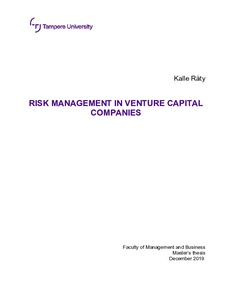Risk Management in Venture Capital Companies
Räty, Kalle (2019)
Räty, Kalle
2019
Kauppatieteiden tutkinto-ohjelma
Johtamisen ja talouden tiedekunta - Faculty of Management and Business
This publication is copyrighted. You may download, display and print it for Your own personal use. Commercial use is prohibited.
Hyväksymispäivämäärä
2019-12-27
Julkaisun pysyvä osoite on
https://urn.fi/URN:NBN:fi:tuni-201912066653
https://urn.fi/URN:NBN:fi:tuni-201912066653
Tiivistelmä
Venture capital companies are investment entities that focus solely on making investments in startups and early-stage growth companies, attempting to generate above-market returns by taking higher risks in their investments. Making investments in high-risk startup and early-stage growth companies means that venture capital companies have to implement sophisticated and robust processes to identify, analyze, manage and monitor wide variety of different risks associated with small and fast-growing companies that are often developing cutting edge technology and creating new innovative business models. In addition, venture capital companies also have to manage company level risks that are related to business operations and factors, such as reputation, capital raising process, financial contracting and exiting investments.
The purpose of this study is to understand how venture capital companies structure risk management strategy and processes on company level. Furthermore, the study attempts to identify what are the most important risks that venture capital companies face in their business and what methods and techniques venture capital companies use to mitigate those risks. The study was conducted using a qualitative research method and the research data was collected through semi-structured interviews in order to gain deeper understanding of the subject matter and the motivations of the interviewees. In total, four interviews were conducted. The interviewees were partners and employees in venture capital companies and other investment companies that had at least one active venture capital fund under their management. All of the participants were selected so that the sample would be as representative as possible. The questions presented were based on common risks and risk management methods found both in studies concerning venture capital investing and literature about venture capital risk management. They were designed to be semi-structured and open-ended so that it would be possible to gain in-depth information about the topics of the interview and to have the option to further explore any of the topics.
The findings of the study indicate that venture capital companies are able to manage their risks without creating a formal company level risk management strategy or complex company level risk management structures. Instead, the data shows that venture capital companies use standardized risk management frameworks for evaluating the risks and return potential of individual investments and that the venture capital industry has a fairly standardized set of notable risks and risk management methods that are used to control and mitigate those risks. The results also indicate that reputational risks, risks concerning insufficient or inadequate screening and due diligence processes and the risks of a premature exit transaction have the highest importance of direct operational risks, whereas on the risk management side, the most important methods for controlling and mitigating risks are portfolio diversification, thorough screening and due diligence processes, active monitoring of portfolio companies and careful financial contracting. The analysis of the data also reveals that most of the interviewed venture capital investors do not recognize company level risk management as a major differentiator or competitive advantage when raising capital for a new fund or sourcing new investment opportunities.
The purpose of this study is to understand how venture capital companies structure risk management strategy and processes on company level. Furthermore, the study attempts to identify what are the most important risks that venture capital companies face in their business and what methods and techniques venture capital companies use to mitigate those risks. The study was conducted using a qualitative research method and the research data was collected through semi-structured interviews in order to gain deeper understanding of the subject matter and the motivations of the interviewees. In total, four interviews were conducted. The interviewees were partners and employees in venture capital companies and other investment companies that had at least one active venture capital fund under their management. All of the participants were selected so that the sample would be as representative as possible. The questions presented were based on common risks and risk management methods found both in studies concerning venture capital investing and literature about venture capital risk management. They were designed to be semi-structured and open-ended so that it would be possible to gain in-depth information about the topics of the interview and to have the option to further explore any of the topics.
The findings of the study indicate that venture capital companies are able to manage their risks without creating a formal company level risk management strategy or complex company level risk management structures. Instead, the data shows that venture capital companies use standardized risk management frameworks for evaluating the risks and return potential of individual investments and that the venture capital industry has a fairly standardized set of notable risks and risk management methods that are used to control and mitigate those risks. The results also indicate that reputational risks, risks concerning insufficient or inadequate screening and due diligence processes and the risks of a premature exit transaction have the highest importance of direct operational risks, whereas on the risk management side, the most important methods for controlling and mitigating risks are portfolio diversification, thorough screening and due diligence processes, active monitoring of portfolio companies and careful financial contracting. The analysis of the data also reveals that most of the interviewed venture capital investors do not recognize company level risk management as a major differentiator or competitive advantage when raising capital for a new fund or sourcing new investment opportunities.
